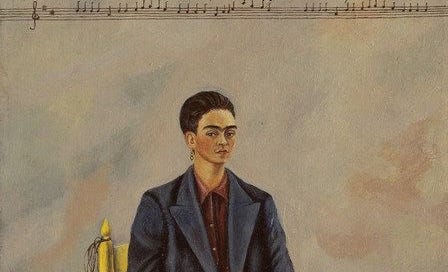I find myself drawn to this painting. Or perhaps it’s more accurate to say that I have a deep admiration for Frida Kahlo. Upon viewing this artwork, it’s as if narratives begin to unfold with every detail that I shift my focus on, adding layers to my understanding. At first glance, I wondered whether it was a guy or a woman. Then I turn my attention to the strands of hair on the floor. Then a scissor in the figure's hand. It feels as though you're gradually piecing together the elements, almost like anticipating what more it has to offer you. I recently watched the latest Frida (2024) documentary on Prime, and I absolutely adored every minute of it. The film provides candid insights, narrated through Frida’s diary entries, letters, and photographs, offering a more intimate understanding of the various facets of this iconic figure. Her life is indeed as interesting as her artworks.
I resonate with Frida Kahlo on a personal level because, like her, I place great importance on self-expression. For me, it serves as a means of confronting and understanding my true self. I have great admiration for her self-portraits because I understand the depth of personal introspection that accompanies such work. I believe that painting someone else’s portrait feels easier than painting my own because I don’t have the same level of personal connection. When painting myself, there’s a vulnerability that comes with confronting the person I truly know. There’s a fear of revealing parts of myself that I may be reluctant to confront and share with others.
The artwork “Self-Portrait with Cropped Hair” not only reveals Frida’s vulnerability but also tackles social norms. One significant subject matter that I take away from this picture is gender, disregarding established rules and exposing an androgynous identity. This is reflected in the elements surrounding and within the figure. I interpret the scissors and hair strands as representing Frida's newly discovered independence. She seems to be stating that she no longer wants to "settle" into this undesirable persona or be a part of "something.” Though the tiny details, such as the one earring intact, suggest that she's still in touch with her femininity. There are also details like the song lyric at the top, “Look, If I loved you it was because of your hair. Now that you are without hair, I don’t love you anymore.” and drawing a parallel between the art and the artist's life, where Frida had just gotten divorced at the time this painting was created.
My course encompasses politics, and is there anything more patriarchal than the political world? Though the painting focuses on Frida’s separation, this artwork somehow gives me a sense of how women are attempting to break the stereotype that politics is a man's job because women are overly sensitive and this is viewed as a conflict when it comes to making decisions. But then, isn't being sensitive an ideal thing? It's actually what the current times need the most: empathy. Frida's newfound autonomy, on the other hand, can be compared to my feelings as I considered if this path was right for me. That feeling of being in a position where you finally have the option to do so. But then you begin to doubt yourself because of the mental voices you hear, wondering if you truly made the right choice.
In the end, like Frida, I also vowed to support myself.
Frida once explained that she paints self-portraits because she’s often alone. Because she’s the person she knows best. So yeah—I think I pretty much know myself more than these silly little voices renting my head.





